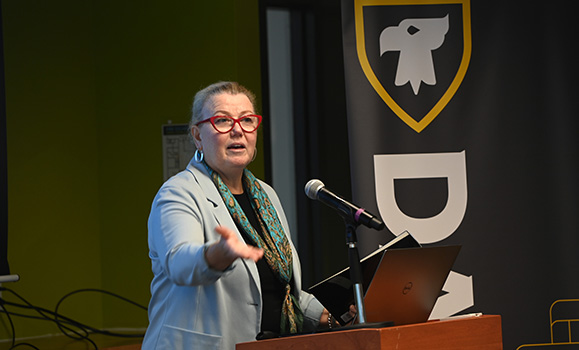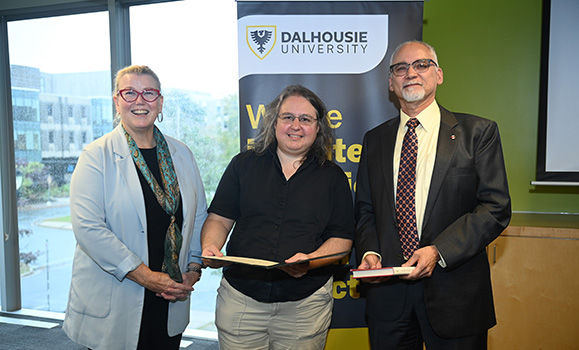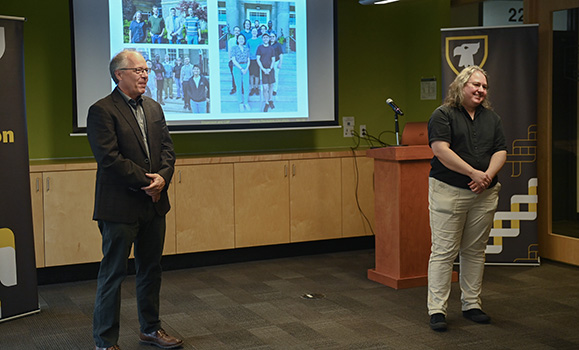In May, Department of Chemistry faculty member Dr. Erin Johnson was named the 2021 recipient of the Steacie Prize — one of Canada’s most prestigious awards for researchers 40 years old or younger.
Members of Dr. Johnson’s research group, colleagues from the Department of Chemistry, and others gathered earlier this month to celebrate her win — the first for Dal and the Atlantic provinces in the Steacie Prize’s nearly 60-year history — at a reception in the Student Union Building.
A theoretical chemist, Dr. Johnson and her research group focus on computational chemistry. Rather than conducting experiments in a lab, this work involves developing computational methods that allow researchers to better understand the forces between molecules that facilitate interactions.
“My group doesn’t work in a lab and instead we do all of our work on computers,” said Dr. Johnson, the Herzberg-Becke Chair in Theoretical Chemistry, at the event. “The idea is that simulating chemical processes computationally is a process that can inform experiments.” The discipline of computational chemistry provides an advantage over physical chemistry in that materials required for traditional lab experiments are not needed, potentially leading to cost and time savings.
“Dr. Johnson’s work provides a scientific core from which successive layers of science radiate, with the last layer being the development of products that are changing our world for the better,” said Dr. Alice Aiken, Dalhousie’s vice president research and innovation, in her opening remarks, also noting that the impact of this work can be felt in designing new drugs for the pharmaceutical industry as well as in consumer products like batteries.

Dr. Alice Aiken.
A career’s worth of accomplishments at an early age
The Steacie Prize is awarded by the Trustees of the E.W.R. Steacie Memorial Fund, a private foundation dedicated to the advancement of science and engineering in Canada. The award consists of a $10,000 cash prize, a certificate and a biography of E.W.R. Steacie, a physical chemist and former president of the National Research Council of Canada.
Dr. Dan Wayner, a Trustee of the fund and Dal chemistry alum (PhD ‘84), was on hand to present Dr. Johnson with the award. In his speech, he noted that the 2021 competition had a record number of nominations, but that Dr. Johnson “quickly rose to the top,” despite the overwhelming quality of the nominees. “Most of us would be happy to do in a career what these people have accomplished by the age of 40,” he said of the nominees.
So far, Dr. Johnson has published more than 140 papers that have been cited more than 20,000 times. She is also credited with developing some of theoretical chemistry’s key computational methods, including the eXchange-hole Dipole Moment or XDM dispersion method, the Becke-Johnson exchange potential, and Non-Covalent interaction plots.

(L to R): Dr. Alice Aiken, Dr. Erin Johnson and Dr. Dan Wayner pose for a photo following the presentation of the Steacie Prize.
Mentoring the next generation of chemists
Dr. Norman Schepp, chair of the Department of Chemistry, praised Dr. Johnson’s impact in the classroom. “Not only is she an excellent researcher, but she’s an excellent teacher,” said Dr. Schepp. “I think our students would say she’s an excellent mentor and a great person to work for.”
In attendance were several members of her research group, and Dr. Johnson jokingly noted that she worries about being “overrun” while displaying a series of photos that demonstrated the growth of her lab over time.
Some additional space might be needed — as one of her field’s brightest young researchers, chances are she will have no shortage of willing collaborators in the years to come.

Dr. Norman Schepp, left, and Dr. Erin Johnson take questions from the audience.

